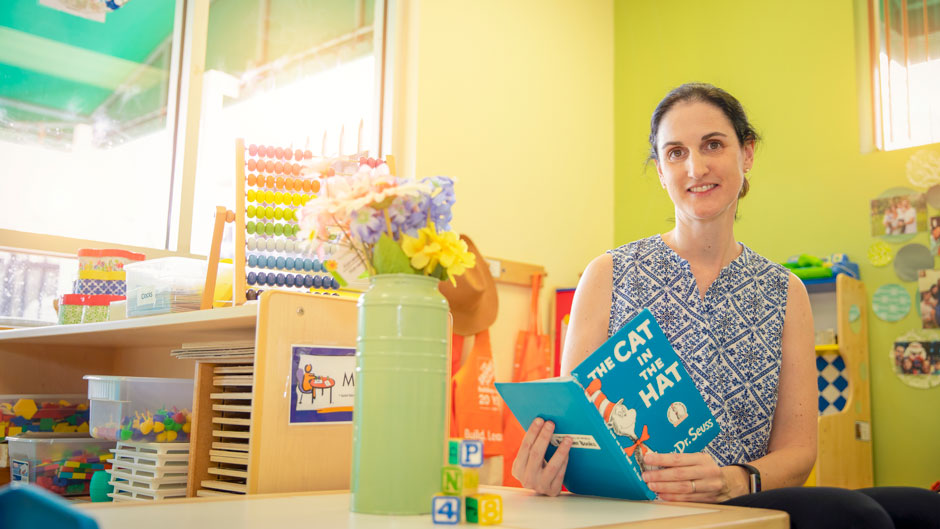As a developmental specialist in New York during the late 1990s, Rebecca Bulotsky Shearer routinely encountered children who were not prepared academically and behaviorally to enter kindergarten.
Shearer struggled to help them. But a system that allowed many of those children to fall between the cracks often hampered her efforts. So she decided to do something about it, enrolling in graduate school with the conviction that she could make a bigger impact in helping those children through applied research.
Today, as a University of Miami associate professor of psychology, Shearer is the lead investigator on a research project aimed at increasing the proportion of kids in Miami-Dade County who enter kindergarten ready to learn.
With more than 80,000 children in publicly funded pre-K programs in the county as the cohort, the Partnership for School Readiness and Early School Success is analyzing data on preschool participation rates, early childhood assessments, and kindergarten outcomes. It will also assess community resources to identify locations in Miami-Dade where better early care education programs are needed; share data and findings with a multitude of community stakeholders; and identify ways research findings and data can be used to improve future early childhood programs.
Closing the kindergarten readiness gap is crucial, said Shearer. While nearly 80 percent of all children in Miami-Dade participate in some kind of early care and education program, she and her community partners are concerned that too many of the children enter kindergarten classrooms lacking basic knowledge of letters and numbers and the social skills needed to pay attention in class and get along with other kids. Shearer believes that research can identify opportunities to increase access to learning experiences countywide that promote readiness.
“That’s one of the reasons we started the project—to figure out where we can change things and foster better access to higher quality programs,” said Shearer.
The problem is not endemic to Miami-Dade. About 76 percent of the students who went through Florida’s free Voluntary Prekindergarten Program—an initiative designed to give 4- and 5-year-olds a jump start by enhancing their pre-reading, pre-math, language, and social skills—tested ready for kindergarten in 2010. But this year that number dropped to 54 percent, according to test results released by the Florida Department of Education.
The reasons why so many children aren’t kindergarten-ready are complex, but the problem is not unsolvable, said Shearer, a child clinical and school psychologist who has worked as a practitioner and researcher with young children and families living in impoverished urban areas for the past 15 years.
“It’s really an issue that faces school districts across the nation,” she said. “We’re focusing on what kinds of early care and education programs children had access to. We’re trying to determine if going to a high-quality preschool program at age 3 or 4 or a high-quality Head Start Program before kindergarten puts children, regardless of how poor their families are, back on a level playing field as far as being ready to read, make friends, and pay attention in a classroom.”
Shearer received initial funding for the project in 2014 from the U.S. Department of Education, and since then, the initiative has expanded, with the Children’s Trust coming aboard as both a partner and sponsor. Miami-Dade County Public Schools, the Early Learning Coalition of Miami-Dade/Monroe, Head Start/Early Head Start, and Individuals with Disabilities Education Act Early Intervention programs are also partnering on the project.
UM’s Center for Computational Science has undertaken what is probably the project’s most important endeavor, creating the data management software that allows Shearer and her team to identify and track students throughout their early childhood learning experiences.
Shearer and her colleagues have also received funding for the second set of Phase I grants awarded by the University of Miami Laboratory for Integrative Knowledge, or U-LINK, a key initiative of the Roadmap to Our New Century. While the Department of Psychology is the lead entity, UM researchers in public health sciences, health economics, history, pediatrics, architecture, and geography and regional are also involved in the study.
Among the key findings already generated by the project:
• Four out of five Miami-Dade County Public School kindergarten children have had at least one known preschool experience. “This is encouraging,” said Shearer, “because national research suggests that high quality early childhood participation promotes school readiness.”
• Overall attendance rates are high across all preschool programs, with an average attendance rate of about 84 percent.
• Children attending preschool regularly scored higher on pre-K and kindergarten school readiness tests.
The study recommends expanding early childhood services and increasing access to high quality programs in targeted areas of greater need. It also touts the effectiveness of public awareness campaigns for their ability to help increase awareness of the importance of early childhood education, and it recognizes tools like an attendance software program for Miami-Dade school-aged children, which can help monitor attendance in real time and reach out to families whose children are not attending school on a regular basis.
More than 300 Miami-Dade pre-K and kindergarten teachers have been interviewed as part of the study, and more results and recommendations will follow.
“What’s important is that we’re developing relationships within the community to create the interventions that close the kindergarten-readiness gap,” said Shearer.

